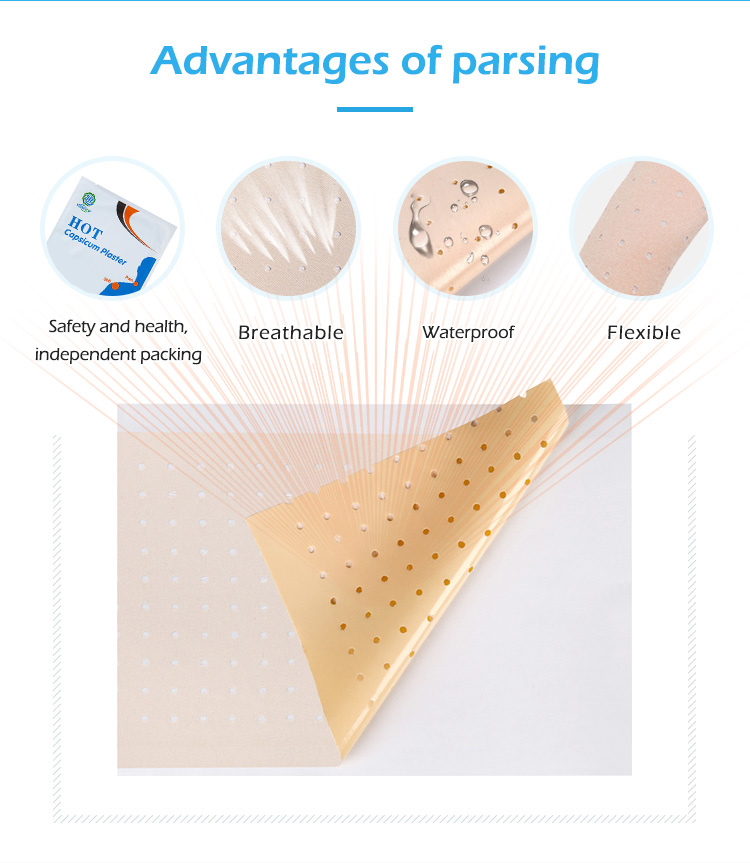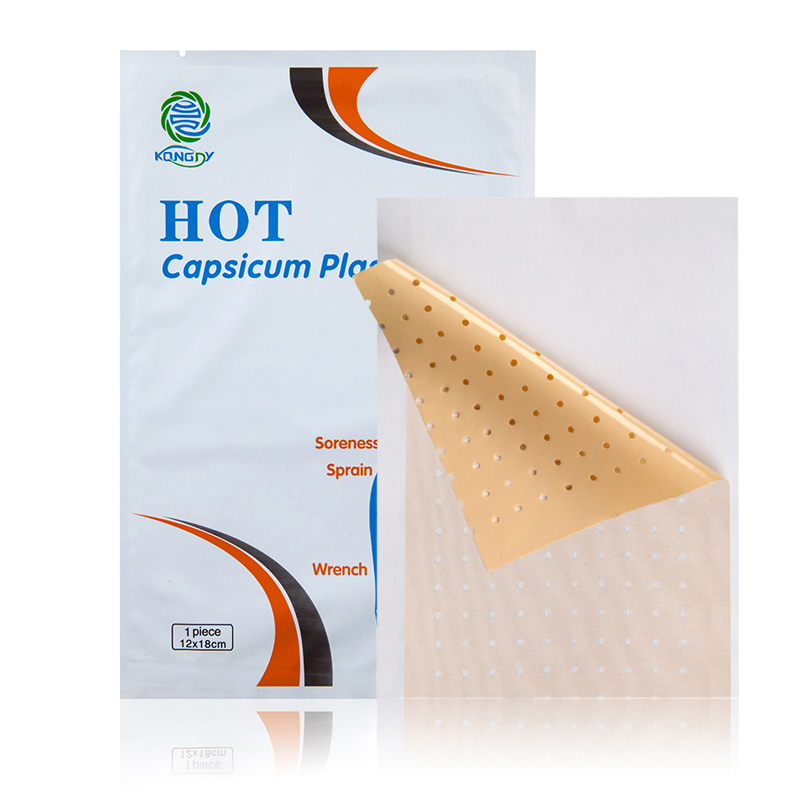How Do I Ensure My Hot Capsicum Plasters Comply with Regulations?
When launching Hot Capsicum Plasters, it is crucial to ensure they comply with relevant regulations. Compliance not only helps you avoid legal penalties but also boosts your brand’s credibility and consumer trust. Whether you're working with a Hot Capsicum Plaster Manufacturer, an OEM partner, or developing a Private Label Hot Capsicum Plaster, understanding the regulatory landscape is essential. In this guide, we'll discuss the steps and considerations you need to take to ensure that your Custom Hot Capsicum Plaster meets all necessary regulatory requirements.

1. Understand the Regulatory Requirements in Your Target Market
The first step in ensuring compliance is to thoroughly understand the regulatory environment in the countries where you intend to sell your Hot Capsicum Plaster. Regulations can vary significantly depending on the market, with different standards for health products in the U.S., Europe, Asia, and other regions.
Key Regulatory Bodies to Consider:
- United States: The U.S. Food and Drug Administration (FDA) regulates over-the-counter (OTC) drugs like Hot Capsicum Plasters under the monograph system. Compliance with FDA guidelines is essential.
- European Union: In the EU, medical devices, including some types of pain relief patches, must adhere to the Medical Device Regulation (MDR). Products may require CE marking to indicate compliance.
- Asia: Countries like China, Japan, and South Korea have their own regulatory bodies, such as China’s National Medical Products Administration (NMPA), that enforce stringent regulations on medical and wellness products.
How to Research Regulations:
- Consult the Manufacturer or OEM: A reputable Hot Capsicum Plaster Manufacturer or Hot Capsicum Plaster OEM will be familiar with the regulatory requirements for different markets. They can guide you through the process or ensure compliance from the outset.
- Hire Regulatory Consultants: If you're unsure about the compliance process, hiring a regulatory consultant with expertise in your target market can save time and ensure you meet all necessary regulations.
2. Ensure Ingredient Compliance
The primary active ingredient in Hot Capsicum Plasters is capsicum extract, which provides heat and pain relief. However, different countries may have specific limits on the concentration of capsicum or other additives, such as menthol or camphor. It's critical to make sure that your Custom Hot Capsicum Plaster formulations are safe and compliant with these regulations.
Steps to Ensure Ingredient Compliance:
- Check Ingredient Restrictions: Some countries have restrictions on certain ingredients. For example, capsicum concentration may be limited, or other pain-relieving additives may be controlled.
- Use Approved Ingredients: Ensure that your Hot Capsicum Plaster Manufacturer sources ingredients that are approved by regulatory bodies like the FDA, EMA (European Medicines Agency), or local authorities in your target region.
- Review Safety Standards: Some regulations require additional safety testing or documentation for certain ingredients. Make sure your product complies with any safety assessment requirements, especially for sensitive ingredients like capsicum.
3. Work with a Certified Manufacturer
One of the most reliable ways to ensure regulatory compliance is by partnering with a Hot Capsicum Plaster Supplier or OEM that is already certified and follows good manufacturing practices (GMP). Manufacturers with the appropriate certifications are already familiar with the regulatory process and can help you navigate complex requirements.
Key Certifications to Look For:
- GMP (Good Manufacturing Practice): Ensures that products are consistently produced and controlled according to quality standards.
- ISO Certifications: International Organization for Standardization (ISO) certifications like ISO 13485 (for medical devices) or ISO 9001 (for quality management) indicate a manufacturer’s commitment to quality and compliance.
- FDA Registration: For U.S. markets, ensure the Hot Capsicum Plaster Manufacturer is registered with the FDA if your product qualifies as an OTC drug.
4. Labeling and Packaging Requirements
Labeling is a critical aspect of regulatory compliance for Private Label Hot Capsicum Plasters. Misleading or incorrect labels can lead to regulatory action, including fines, recalls, or a ban on product sales. Therefore, you must ensure that your product labels comply with all applicable regulations.
Key Labeling Considerations:
- Active Ingredient Listing: Clearly list capsicum extract and any other active ingredients, including their concentrations.
- Usage Instructions: Provide detailed instructions on how to use the Hot Capsicum Plaster correctly, including any warnings or contraindications.
- Health Claims: Be careful about the health claims you make. In many regions, you must avoid claims that are not supported by scientific evidence or that imply the product can cure diseases.
- Language Requirements: Ensure your product labeling is in the required languages for each region. For instance, the European Union may require multiple languages on the packaging, while countries like China require labeling in Mandarin.
Packaging Regulations:
- Child-Resistant Packaging: Depending on the market, you may need to use child-resistant packaging for products with active ingredients like capsicum.
- Eco-Friendly Packaging: Some regions, such as the EU, may have additional regulations related to sustainability and recyclability of packaging materials. If you're planning to market your Custom Hot Capsicum Plaster as eco-friendly, make sure the packaging meets these regulations.
5. Perform Stability and Safety Testing
To ensure that your Hot Capsicum Plasters meet safety standards, stability testing is often required. This ensures that the product remains effective and safe throughout its shelf life. Many regulatory bodies, including the FDA, require stability data for approval.
Types of Testing to Consider:
- Stability Testing: This ensures that the Hot Capsicum Plaster retains its effectiveness and safety over time. It should include tests under various conditions, such as different temperatures and humidity levels.
- Allergy Testing: Capsicum can cause allergic reactions in some people. Ensure that your product undergoes dermatological testing to verify its safety for all skin types.
- Efficacy Testing: Ensure that the Custom Hot Capsicum Plaster provides the promised pain relief. This may involve clinical studies or user trials to gather data on product performance.
6. Keep Up with Regulatory Changes
Regulations can change over time, particularly in the health and wellness industry. New legislation, ingredient bans, or updates to packaging standards can affect the compliance status of your Private Label Hot Capsicum Plaster.
How to Stay Updated:
- Regular Communication with the Manufacturer: Ensure your Hot Capsicum Plaster Supplier or OEM keeps up with the latest regulatory updates. Many manufacturers will provide alerts if a new regulation could impact your product.
- Join Industry Associations: Being part of industry organizations can help you stay informed about regulatory trends and changes. Associations often provide resources and updates on compliance issues.
- Regulatory Subscriptions: Consider subscribing to regulatory databases or newsletters that provide updates on laws affecting pain relief products.
Conclusion
Ensuring your Hot Capsicum Plasters comply with regulations is a multi-step process that involves understanding the legal landscape in your target market, choosing the right ingredients, working with certified manufacturers, adhering to labeling requirements, and staying current with regulatory changes. By following these steps and working closely with your Hot Capsicum Plaster OEM, you can bring a compliant, high-quality product to market that meets both customer needs and regulatory standards.
Frequently Asked Questions (FAQs)
1. What certifications should a Hot Capsicum Plaster Manufacturer have?
A reputable Hot Capsicum Plaster Manufacturer should have GMP certification, ISO certifications (such as ISO 13485 for medical devices), and FDA registration (if selling in the U.S.).
2. How can I ensure the ingredients in my Custom Hot Capsicum Plaster are compliant?
Check the regulations in your target market regarding ingredient concentrations and approved substances. Work with a Hot Capsicum Plaster OEM that sources high-quality, compliant ingredients.
3. What labeling requirements should I follow for my Private Label Hot Capsicum Plaster?
Labels should include active ingredients, usage instructions, warnings, and health claims that comply with local regulations. Ensure that the label is in the required language(s) for the region.
4. Do I need stability testing for my Hot Capsicum Plasters?
Yes, stability testing is essential to ensure your product maintains its safety and efficacy over time. Many regulatory bodies require stability data before approving a product for sale.
5. How often do regulations for Hot Capsicum Plasters change?
Regulations can change frequently, particularly in the health and wellness sectors. Stay updated by working with your Hot Capsicum Plaster Manufacturer and subscribing to regulatory updates.






